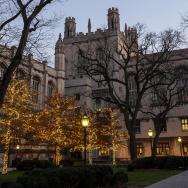University of Chicago Prof. Rina Foygel Barber, a statistician known for her work in quantifying uncertainty, has been awarded a 2023 MacArthur Fellowship.
Given each year by the John D. and Catherine T. MacArthur Foundation, the prestigious grants recognize individuals from across disciplines who “show exceptional creativity in their work.” The MacArthur recipients get $800,000 paid in quarterly installments over five years.
Barber, who serves as the Louis Block Professor of Statistics at UChicago, is recognized for her work in designing ways to better handle large or imperfect datasets. This gives researchers in a range of fields—from healthcare to climate science to astronomical imaging—tools to improve their analysis.
In particular, she focuses on ways to quantify the uncertainty of the results of a data analysis. This helps people make decisions about what they should do with the output—and when to say a specific question cannot actually be reliably answered with the data at hand.
“These questions are particularly important in the many data-driven fields that rely on constantly evolving algorithms and models, such as healthcare (e.g., predicting patient risk of adverse events), social media (e.g., recommending who to connect with or what news articles to read), finance (e.g., predicting how the market will behave), and many more,” she explained.
One of Barber’s areas of focus is a type of dataset known as “high-dimensional” datasets. This refers to datasets where there are many potential variables at play relative to the number of data points themselves. For example, a study following population health might include many different variables like age, height, blood pressure, pre-existing conditions, etc. Barber co-developed and refined a particularly influential technique for working with these datasets that reduces the likelihood of false positives during analysis.
The MacArthur Foundation wrote, “Barber’s innovative work at the intersection of statistics, machine learning, and data science is critical to overcoming the challenges presented by use of high-dimensional datasets.”
Barber said that the opportunities for collaboration at the University of Chicago have greatly supported her work. “It's been incredible to get to collaborate with many great colleagues, students, and postdocs within the statistics department,” she said. “There is a really strong research environment here across statistics, computer science, and data science that has been great for my group's research, and I've also had a really rewarding long term collaboration with researchers in radiology and medical physics.”
With the award, she hopes to build research collaborations both within UChicago and across institutions; offer students more opportunities to travel to conferences; and to continue her co-authorship on a textbook on distribution-free inference.
Barber received her undergraduate degree from Brown University and an MS (2009) and a PhD (2012) from the University of Chicago. She was a National Science Foundation Postdoctoral Fellow at Stanford University prior to joining the Department of Statistics at the University of Chicago.
Barber joins multiple colleagues at the University of Chicago who have received MacArthur Fellowships, most recently including Profs. Reuben Jonathan Miller in 2022 and Jacqueline Stewart in 2021.

